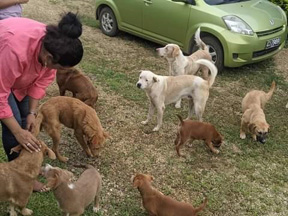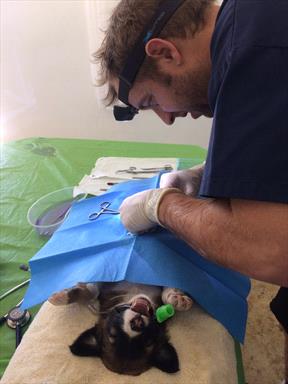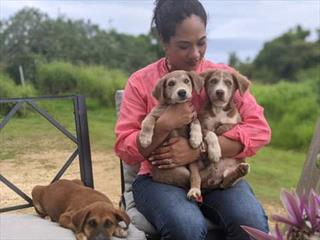Kaufusi dogs

Photo by Loisi Sanft
The dog-loving household of Cecilia Kaufusi acutely feels the lack of a veterinarian and regular spay/neuter services in the remote nation of Tonga.
 Listen to this story.
Listen to this story.
Cecilia Kaufusi, a resident of the remote South Pacific island kingdom of Tonga, cares about her family's eight dogs so much, she can hardly bear the emotional weight of the bond.
When traveling, Kaufusi frets about their welfare. When home, her family jokingly complains that she feeds the dogs better meals than the people. "I never wanted to get a dog for myself because of the way I am," Kaufusi told the VIN News Service. "I don't want to get hurt if they die. I get so sensitive when it comes to dogs."
But Kaufusi gave in about four years ago, when the older of her two sons requested a pup for his eighth birthday. Her younger boy wanted one, too, so the family got a second dog that same day. The number of dogs they care for has since multiplied.
It's of little surprise, then, that Kaufusi is unhappy about an unfortunate fact of life in Tonga: The country doesn't have a single veterinarian among its 100,000-plus residents. Care in Tonga has been periodically provided for free by fly-in, fly-out volunteer veterinary professionals whose involvement is coordinated by South Pacific Animal Welfare (SPAW), a charitable organization based in New Zealand, more than 1,400 miles away.
The coronavirus pandemic prompted the Tongan government last year to severely restrict entry to the country, which has recorded no cases of COVID-19. Meanwhile, its animal population has gone without veterinary care for around 14 months and counting, according to Dr. Geoff Neal, SPAW's head practitioner.
Neal doubts the government will reopen Tonga's borders this year, as it endeavors to keep COVID-19 away from a population that has relatively high rates of comorbidities, such as diabetes and obesity.
Dr. Geoff Neil

SPAW photo
Dr. Geoff Neal, lead veterinarian at South Pacific Animal Welfare, spays a Tongan dog in 2017. His organization has not visited Tonga since December 2019 because of border restrictions spurred by the COVID-19 pandemic.
"We were all set to rock back in during March 2020 and crack on with some big projects, but then the whole world shut down," Neal told VIN News. COVID-19 was formally declared a pandemic that month.
An unusual situation?
Tonga appears to be rare as a country that lacks a single resident veterinarian, although it's hard to say for sure because no one tracks it. A global list of practitioner tallies kept by the World Animal Health Organisation includes only those registered at a national level, and the list is dependent on countries supplying accurate data. Countries that consistently show up each year as having no veterinarians include Nauru, also in the South Pacific, and Antarctica.
Dr. Ben Brown, a practitioner based in Sydney, Australia, who has worked in Nepal and Nicaragua for the international charity World Vets, said Tonga's situation seems unusual — but only to a point.
"I can't think of any countries that specifically have no vet, but there are lots of places where there are a lack of vet resources or vets that are not trained in surgery," Brown said, citing Nepal, India and countries in Africa and Central America as examples. "In many parts of the world, vet clinics are more like a vet pharmacy, feed store or pet shop."
Tonga does have a veterinary clinic, near the village of Pea on its main island, Tongatapu. Neal at SPAW said the clinic is staffed by government workers with cursory training, not veterinary professionals.
One of the projects that SPAW was planning in Tonga in 2020 was a dog desexing drive. Without the campaign going ahead, Neal said, Tonga's already-large dog population is exploding (although partly offset by deaths from parvovirus, which is rampant there).
The Kaufusi family, who own and run a cafe in their village of Vaini on Tongatapu, is experiencing the dog problem first-hand. Their first two dogs were neutered by a visiting veterinarian a few years ago. They've since acquired six more, including some they're minding for a sister who is stuck in Australia due to the pandemic. None of those dogs are neutered, so they're reproducing.
Cecilia Kaufusi

Photo by Loisi Sanft
A cafe owner and mother of two sons, Cecilia Kaufusi has her hands full with puppies. A lack of desexing services in Tonga has led to an explosion in the dog population.
"When the first puppies arrived, we gave away six and kept two, but then the other mum just had more, so we're keeping six now," Kaufusi said recently.
A few days later, Kaufusi reported that five of the six puppies had died — from parvovirus, she suspects. The sixth was given away last week; Kaufusi doesn't know its condition but hopes it has survived.
A large proportion of Tonga's population lives in rural areas. Many properties don't have fences or gates, and dogs often roam the streets freely in packs. Tongatapu, which covers about 100 square miles, alone has upwards of 18,000 dogs, Neal said, citing a survey conducted in 2019 by New Zealand's Unitec Institute of Technology. Neal reckons the number is higher now, considering the lack of desexing and the fact that Tonga has around 170 islands — some of which, he adds, have more dogs than people.
Many of those dogs, along with throngs of other animals in Tonga, including cats and livestock such as cows, goats and chickens, are suffering without access to adequate and consistent veterinary care, he said.
Kaufusi tells a harrowing, heartbreaking story about one of her pets, a puppy named Miracle, who was attacked by a larger dog. In the scuffle, Miracle's eye was dislodged from its socket. Kaufusi quickly contacted a local charity, Tonga Animal Welfare Society (TAWS), for help. But because no veterinarians were around at the time, all the group could do was offer pain relief. The puppy died from its injuries.
A call for help
With visiting practitioners kept out by the pandemic, animal welfare needs have fallen heavily onto the shoulders of the six local volunteers who make up TAWS. They include Angela Glover, a British national with a background in advertising. Glover arrived in Tonga about four years ago with her husband James, a tattoo artist; they run a tattoo parlor there. The Glovers helped set up TAWS last March after developing a passion for the plight of Tonga's animals.
Glover used to assist SPAW veterinarians when they visited some four times a year. Now, in addition to carrying out TAWS's usual practice of doling out flea- and worm-control treatments, she obtains treatment advice from Neal via telephone and the internet.
"If people come to us and they've got videos and pictures of an injured animal, we send it to Geoff," she said. "He has a look, and does a virtual diagnosis over the phone, and he can guide us into what kind of medication to give them."
If they have it on hand, that is. Glover says veterinary supplies in Tonga often are scant. Last Saturday, for instance, Tonga's single clinic administered its last dose of euthanasia drug. Even with supplies, telemedicine has its limits. "You can't really do surgery over the phone," Neal pointed out.
Ultimately, all sources contacted by VIN News agreed, Tonga needs a resident veterinarian. But luring a foreigner, or training a local person and convincing them to stay in Tonga, they said, will be challenging.
TAWS is lobbying the Tongan government to provide funding to employ foreign veterinarians, who could perhaps sign up for three-month, six-month or one-year contracts, Glover said. Tonga's agriculture and communications departments and the prime minister's office did not respond to a VIN News request for comment.
As a longer-term solution, Glover and Neal said, some lawmakers are interested in training a local citizen, perhaps by sending them to a veterinary school in Australia or New Zealand. The process would take at least seven years, however, given that completing a veterinary degree takes five years at minimum, and attaining adequate practical experience would take a couple more.
As a third possible solution, Glover wonders if a foreign veterinarian, possibly someone near retirement, might consider making a life change. "Luring someone over shouldn't be that difficult," she said. "Tonga's an amazing little island, with beaches and clear blue water — it's like an undiscovered little paradise, really."
For Kaufusi, a professional veterinarian can't arrive soon enough. "I've met many other families here who really care for their animals," she said. "When something happens, they often have to watch them die, or just don't know what to do. It's very important for us to have our own vet."